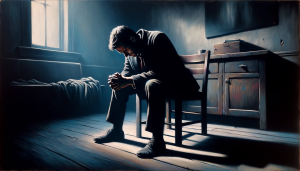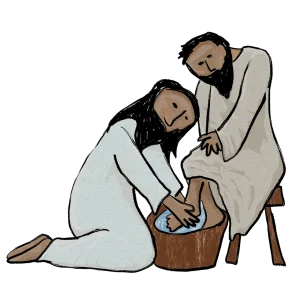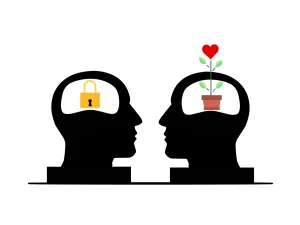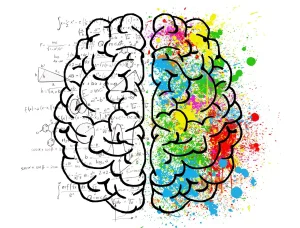

Devotions
Week 1: CREATED IN GOD’S IMAGE: IMAGINATION AS GIFT – Rev Mike Crockett

We begin with the breathtaking claim that humanity is made “in the image and likeness of God” (Genesis 1:26–27). God is not only holy and just; God is also Creator. The first pages of Scripture show a God who speaks light into darkness, shapes form out of chaos, and delights in colour, texture and variety. To be human is to share something of that creative impulse. Imagination is therefore not a luxury or childish indulgence; it is part of our very design.
When Paul prays for the Ephesians that “the eyes of your heart may be enlightened” (Eph. 1:18), he invites them to see with a deeper vision. Christian imagination is not the escape of fantasy but the Spirit’s gift of perceiving reality more fully, seeing what is hidden, discerning what could be, and trusting what God promises before it is visible. The prophets lived this way. Isaiah pictured a peaceable kingdom where wolves and lambs’ dwell together. Ezekiel saw a valley of dry bones come alive. These were not mere dreams but Spirit-inspired pictures of God’s future breaking into the present.
Mystics across the centuries have recognised this inner sight. Teresa of Ávila described the soul as a vast interior castle where Christ dwells in radiant light. Brother Lawrence imagined himself washing pots and pans in the kitchen as though he were at the Lord’s Table. Such vision transforms the ordinary into sacrament.
Our challenge is to reclaim imagination as holy ground. To pause long enough to picture the world as God longs for it to be. To allow Scripture to paint fresh colours on the canvas of our hearts. To invite the Spirit to enlarge our capacity for wonder, empathy and hope. This is not only for artists or poets but for every follower of Christ who longs to live awake.
Prayer:
Creator God, who called light out of darkness, awaken my imagination to Your glory. Cleanse my mind of false fantasies and fill my heart with visions of Your Kingdom. May I see with the eyes of Christ, delight in Your beauty, and live as a sign of Your new creation. Amen.
THE MIND OF CHRIST (7) – Rev Mike Crockett

Coping with Pain and managing suffering. (Hebrews 12:2–3)
“For the joy set before him he endured the cross, scorning its shame, and sat down at the right hand of the throne of God. Consider him… so that you will not grow weary and lose heart.” – Hebrews 12:2–3 (NIV)
We must begin by clarifying the difference between pain and suffering, Pain is what happens to us. It’s the eina! The effects of that pain lead us to suffering as we bemoan the pain, the inconvenience now facing us. Being forced to stay at home or in hospital, the feeling of letting others down, having to miss special events, kicking ourselves for whatever it was that happened. Thats suffering, and we inflict it on ourselves.
Jesus was in obvious pain, but he wasn’t suffering – quite the opposite he scorned the shame. Please see this clearly. He was not going to start feeling sorry for himself.
Pain and distress are the great tests of the human spirit. It exposes what we truly believe. It forces us to confront our limits. For many, it can lead to suffering, bringing confusion, anger, or despair. But in Jesus, we see a radically different response. He managed the suffering—not with bitterness or avoidance, but with purpose, clarity, and even joy.
The mind of Christ does not deny pain. Jesus felt it deeply: in His body, in His spirit, in His soul. He wept, agonised in Gethsemane, and cried out from the cross. Yet beneath it all, there was a steady trust in the Father’s plan. He saw beyond the moment. “For the joy (NOT the SUFFERING) set before him he endured the cross.”
This is not a shallow joy. It is not about pretending everything is fine. It is about seeing through the pain to the promise. Jesus endured because He trusted that rejection was not the end of the story. He saw the end result it would bring—the salvation of the world, the restoration of all things.
To have the mind of Christ is not to become caught up in self-inflicted suffering but to walk through the challenge with purpose. It is to hold on to hope when life hurts. To remain faithful when tempted to give up. To fix our eyes, not on our present struggle, but on the joy that lies beyond it.
Hebrews urges us to “consider him”—to meditate on the way Christ rose above suffering—not as a distant example, but as a present companion. He knows what it is to be blamed unjustly, to be misunderstood, abandoned, betrayed. And He walks with us still.
This mindset transforms how we view hardship. We don’t have to see pain as punishment. We can begin to ask: What might God be forming in me through this? What fruit could grow from this season? The cross, after all, gave way to resurrection. So let us not grow weary. Let us not lose heart. The One who endured is the One who sustains us too.
Rev Mike Crockett is a trained Mindfulness Therapist specializing in this field and would be happy to sit with you if you are struggling in this area of your life 0813366143
GOD IN THE DARKNESS – Rev Mike Crockett

God in the darkness
You see me even when I cannot see myself.
You are near, though I feel far from everything.
I sit in silence, unsure of the way forward.
But still—I am held.
When the darkness comes like a heavy fog,
Whisper to me that this, too, is not beyond Your reach.
You have walked roads of sorrow;
You have known the quiet ache of the soul.
Remind me that I am not my feelings.
I am not my failures.
I am not forgotten.
Give me grace for this moment—
Not the strength to leap, but the courage to stay.
To breathe,
To notice,
To trust that even here, you are at work.
And when I cannot pray,
May Your Spirit pray for me.
When I cannot hope,
May others hope on my behalf.
Until the morning comes again—
Be my light in the dark place.
Amen.
THE MIND OF CHRIST (6) – Rev Mike Crockett

The Mind of Christ – that of a Servant.
“Now that I, your Lord and Teacher, have washed your feet, you also should wash one another’s feet. I have set you an example that you should do as I have done for you.” – John 13:14–15 (NIV)
In the upper room, on the night before His crucifixion, Jesus did something no one expected. Very deliberately he took off His outer robe, wrapped a towel around His waist, and began to wash His disciples’ feet. It was the task of the lowest servant—grimy, menial, humiliating. Yet the King of heaven knelt before fishermen and tax collectors and scrubbed the dust from between their toes.
This was not a symbolic act. It was a window into the very mind of Christ. read more…
THE MIND OF CHRIST (5) – Rev Mike Crockett

The Mind of Christ Seeks the Father’s Will (John 5:30)
“By myself I can do nothing; I judge only as I hear, and my judgment is just, for I seek not to please myself but him who sent me.” – John 5:30 (NIV)
To understand the mind of Christ, we must see how deeply it was anchored in the will of the Father. Again and again in the Gospels, Jesus makes it clear: He does nothing on His own. His life is not driven by personal ambition or even human wisdom. Instead, He lives in continual dependence on God.
This is not passive fatalism, but active obedience. Jesus listens, discerns, and responds—not to the noise of public opinion or the demands of the crowd, but to the quiet voice of the Father. His inner compass is unwavering: “I seek not to please myself, but Him who sent me.” read more…
THE MIND OF CHRIST (4) – Rev Mike Crockett

The Mind of Mercy and Forgiveness (Luke 23:34) “Jesus said, ‘Father, forgive them, for they do not know what they are doing.’” – Luke 23:34 (NIV)
Much of the essence of one’s life is found in the mind. What goes on in the mind colours your outlook on life, your experience of life and your quality of relationships. Your mind holds the door to your desires and your personality.
The mind is where belief, intention, and action converge, shaping the essence of one’s life. In the mind, we wrestle with both the weight of our experiences and the possibilities of transcendence. read more…
THE MIND OF CHRIST (3) – Rev Mike Crockett

“When Jesus landed and saw a large crowd, he had compassion on them, because they were like sheep without a shepherd. So he began teaching them many things.” – Mark 6:34 (NIV)
The question to ask is not whether it is realistic or practical or viable but whether it is imaginable. We need to ask if our consciousness and imagination have been so assaulted and co-opted by the prevailing consciousness that we have been robbed of the courage or power to think an alternative thought … the imagination must come before the implementation.”
The Christian mind, at its heart, is called to transcend mere practicalities and embrace the vast horizons of imagination and creativity. It begins not with a blueprint for a better world but with a vision of that world seen through the lens of divine possibility. Imagination, in this sense, is not escapism but a courageous act of faith—a refusal to accept the status quo as inevitable and unchangeable.
Creativity flows from this imagination, forming the very substance of what it means to live in alignment with the Kingdom of God. It is the act of participating in the divine narrative, weaving threads of hope, mercy, and justice into the fabric of human existence. A Christian imagination does not shy away from the brokenness of the world but seeks to envision redemption within it, crafting solutions that are as inspired as they are transformative.
Without imagination, faith risks becoming containment—bound by tradition and limited by convention. But when infused with creativity, faith inspires bold action, challenging systems of oppression and envisioning communities of radical love and grace. The Christian mind must therefore be a fertile ground where imagination blooms and creativity transform, echoing the divine mandate to “make all things new.”
The big lie is to tell ourselves, “The need is too great, the areas of need are too dangerous, and I am too helpless to do anything about it.” We then excuse ourselves from doing anything. The well-known story of the good Samaritan tells us that he only helped one person, but that he helped him properly. The need in our country is great, but just helping one person properly can make a huge difference to that person.
Millions in South Africa remain the victims of injustice through forced evictions. I think of the ganglands on the Cape Flats. These were people who lived in town, in reasonable houses and with a strong community leadership. Now torn from their homes and slung out into those compound-like flats new leadership structures emerged and suddenly a violent gang culture with drugs the new currency emerged. We call them by many names, forgetting they are the victims of one of humanities greatest injustices. Right here on our doorstep.
Compassion emanates from the deepest parts of our being—from emotional responses, cognitive reasoning, and spiritual inclinations. It is not passive sentimentality; it is active engagement, a discipline that asks us to see others as they truly are and respond with love and care. To cultivate compassion is to align our minds and hearts with the profound truth that every person we encounter carries a story, a struggle, and a longing to be known. In this way, compassion reshapes both the giver and the receiver, making the world a kinder, more connected place.
This is the mind of Christ: seeing people not through the lens of performance, politics, or category—but through the lens of mercy. He doesn’t just see what people do; He sees what they carry. Their fear. Their confusion. Their longing to be known and healed.
Christ’s compassion was not sentimentality. It moved Him to action: He taught, healed, fed, and forgave. Compassion, in the mind of Christ, is never passive. It leads us to show up, to speak gently, to act justly.
To cultivate a compassionate mind, we must ask Christ to show us how to look at others as He does. Not merely with human sympathy, but with divine vision. Where we feel nothing, we ask for tenderness. Where we feel judgement, we ask for understanding.
The mind of Christ is not quick to condemn but quick to care. It recognizes that each person is fighting a battle we cannot fully see.
Michael Crockett has been working in Hanover Park since 2015, particularly among the Mongrel Gang, where he assists in feeding through the Winter, makes time for games with the children, makes use of the Early Childhood Development information. The aim is to break the chain from childhood to gangsterism.
KEEPING CHRIST IN MIND (2) – Rev Mike Crockett

“The mind governed by the flesh is death, but the mind governed by the Spirit is life and peace.” – Romans 8:6 (NIV)
Good news: Sin is that within you which can be forgiven; nay, that which is already forgiven. The greatest step of faith is to believe that Christ has already set you free.
Unlike John Wesley who asked of his preachers, “How goes it with your soul.?”, I am interested in your answer to the question: “How goes it with your mind?” What is it that occupies the dominant space in your mind. Around what or who revolves your thoughts, and what power do those thoughts have over you, your emotions, quality of life, and your interpretation of events?
When Paul speaks of “the mind of Christ,” he is not referring to intellect alone, but to the orientation of the heart and will. In Romans 8, he draws a stark contrast between two ways of thinking: one governed by the flesh, the other governed by the Spirit.
The “flesh” in Paul’s language refers not to our physical bodies, but to a mindset driven by self-interest, fear, pride, and earthly concerns. A mind set on the flesh lives reactively, anxiously chasing after control, validation, and comfort. It resists God’s guidance and becomes entangled in worry, comparison, and judgement.
In contrast, the “mind set on the Spirit” is marked by surrender, trust, and an inner orientation toward God. It is a mind that listens before reacting, yields before grasping, and seeks God’s presence even in the midst of uncertainty. This mind brings “life and peace”—not just eternal life in the future, but deep inner peace in the present.
This is due to the fact that the imagination is not some hypothetical faculty separate from the mind: it is the mind itself in its totality, which, applied to this or that activity, always makes use of the same procedures. And the mind is formed by struggle, not by tranquillity.
The Spirit does not merely visit us from time to time. According to Paul, the Spirit already dwells within us. (1 Cor 3 v 16-17) This means we are never left to navigate our thoughts and feelings alone. The Spirit guides us towards truth, convicts us gently when we stray, and reminds us of our identity in Christ.
But here’s the challenge: the mind does not drift naturally toward the Spirit. Left to itself, it returns to old fears and familiar patterns. We must intentionally set our minds on the things of God. This means slowing down, practicing attentiveness, meditating on Scripture, and praying with a listening heart.
Jesus lived in perfect harmony with the Spirit. He said only what He heard from the Father. He moved with a deep awareness of time, place, and purpose. His was a mind at peace, even when surrounded by chaos.
To have the mind of Christ, then, is to allow the Spirit to govern our thoughts—not through force, but through quiet influence. We begin to think differently, feel differently, act differently—not by trying harder, but by yielding more deeply.
Today, take a moment to ask: “What are the triggers that set my thoughts into a whirl of negativity?” What do I need to release? What might it mean to “set my mind” on the Spirit, right here, right now?
Mike Crockett is qualified in Mindfulness Interventions, helping people to manage their stress, anxiety, depression and grief. You are welcome to make an appointment by dialling 0813366143.
Contact
We are situated at 2 Union Avenue, Pinelands, Cape Town.
GPS Co-ordinates: S 33° 56′ 15.9″ E 18° 29′ 56.15″
Latitude -33.93809 Longitude 18.49967
Church office
email click here
Office hours: Monday to Friday 08h30 to 13h00
Telephone: 021 531 8972
In case of emergencies outside of office hours please contact 021 531 2224
Banking Details
Account name: Methodist Church of SA Pinelands Society
FNB Current Acc 62076803230, Branch code 250655